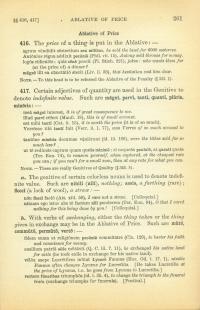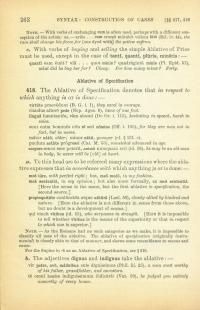416. The price of a thing is put in the ablative.
Agrum vēndidit sēstertium sex mīlibus.
He sold the land for 6000 sesterces.
Antōnius rēgna addīxit pecūniā. (Phil. 7.15)
Antony sold thrones for money.
Logōs rīdiculōs: quis cēnā poscit? (Pl. Stich. 221)
Jokes: who wants them for (at the price of) a dinner?
Māgnō illī ea cūnctātiō stetit. (Liv. 2.36)
That hesitation cost him dear.
Note— To this head is to be referred the Ablative of the Penalty (§ 353.1).
417. Certain adjectives of quantity are used in the genitive to denote indefinite value. Such are māgnī, parvī, tantī, quantī, plūris, minōris.
Meā māgnī interest.
It is of great consequence to me.
Illud parvī rēfer. (Manil. 18)
This is of small account.
Est mihi tantī. (Cat. 2.15)
It is worth the price (it is of so much).
Verrēsne tibi tantī fuit? (Verr. 2.1.77)
Was Verres of so much account to you?
Tantōne minōris decumae vēniērunt (id. 3.106)
Were the tithes sold for so much less?
ut tē redimās captum quam queās minimō: sī nequeās paululō, at quantī queās (Ter. Eun. 74)
to ransom yourself, when captured, at the cheapest rate you can; if you can't for a small sum, then at any rate for what you can
Note— These are really Genitives of Quality (§ 345.b).
a. The genitive of certain colorless nouns is used to denote indefinite value. Such are nihilī [(nīlī) nothing], assis [a farthing (rare)], floccī [(a lock of wool) a straw].
Nōn floccī faciō. (Att. 13.50)
I care not a straw. [colloquial]
Utinam ego istuc abs tē factum nīlī penderem!
(Ter. Eun. 94)
O, that I cared nothing for this being done by you! [colloquial]
b. With verbs of exchanging, either the thing taken or the thing given in exchange may be in the Ablative of Price. Such are mūtō, commūtō, permūtō, vertō.
fidem suam et religiōnem pecūniā commūtāre (Clu. 129)
to barter his faith and conscience for money
Exsilium patriā sēde mūtāvit. (Q. C. 3.7.11)
He exchanged his native land for exile (he took exile in exchange for his native land).
Vēlōx saepe Lucrētilem mūtat Lycaeō Faunus.
(Hor. Od. 1.17.1)
Nimble Faunus often changes Lycœus for Lucretilis.
[He takes Lucretilis at the price of Lycæus, i.e. he goes from Lycæus to Lucretilis.]
vertere fūneribus triumphōs (id. 1.35.4)
to change the triumph to the funeral train
(exchange triumphs for funerals) [poetical]
Note— With verbs of exchanging cum is often used, perhaps with a different conception of the action.
Ariēs . . . cum croceō mūtābit vellera lūtō (Ecl. 4.44)
The ram shall change his fleece for [one dyed with] the yellow saffron.
c. With verbs of buying and selling the simple Ablative of Price must be used, except in the case of tantī, quantī, plūris, minōris.
Quantī eam ēmit? vīlī . . . quot minīs? Quadrāgintā minīs.
(Pl. Epid. 51)
What did he buy her for? Cheap. For how many minœ? Forty.


